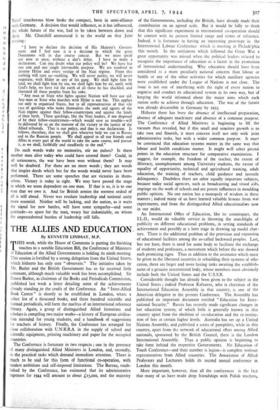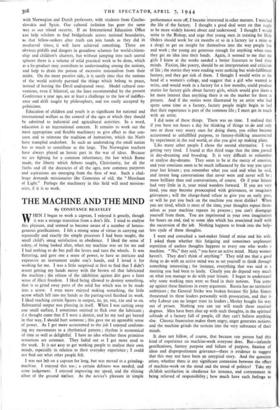THE ALLIES AND EDUCATION,
By KENNETH LINDSAY, M.P.
THIS week, while the House of Commons is putting the finishing touches to a notable Education Bill, the Conference of Ministers of Education of the Allied Governments is holding its ninth meeting. This session is fortified by a strong delegation from the United States, which hitherto has only sent " observers." The initiative taken by Mr. Butler and the British Government has so far received little comment, although much valuable work has been accomplished. Sir Ernest Barker, as chairman of the Books and Periodicals Commission, published last week a letter detailing some of the achievements already standing to the credit of the Conference. An "Inter-Allied Book Centre " is shortly to be established in London, where a select list of a thousand books, and three hundred scientific and learned periodicals, will form the nucleus of an international reference library. Again, a group of distinguished Allied historians and scholars is compiling two major works—a history of European civilisa- tion intended for young students, and a handbook of suggestions for teachers of history. Finally, the Conference has arranged for dose collaboration with U.N.R.R.A. in the supply of school and scientific equipment, printing machinery and paper for the occupied countries.
The Conference is fortunate in two respects ; one in the presence of many distinguished Allied Ministers in London, and, secondly, in the practical tasks which demand immediate attention. There is much to be said for this form of functional co-operation, with modest ambitions and self-imposed limitations. The Bureau, estab- lished by the Conference, has estimated that its administrative expenses for 044 will amount to about L15,000, and the majority of the Governments, including the British, have already made their contribution on an agreed scale. But it would be folly to think that this significant experiment in international co-operation should be content with its present limited range and terms of reference. Indeed, it is fortunate in having an interesting prototype in the International Labour Conference which is meeting at Philade'phia this month. In the settlement which followed the Great War a great opportunity was missed when the political leaders refused to recognise the importance of education as a factor in the promotion of international understanding. Why education should have b:en considered as a more peculiarly national concern than labour or health or any of the other activities for which auxiliary agencies were established under the League of Nations is not clear. The issue is not one of interfering with the right of every nation to organise and conduct its educational system in its own way, but of keeping the world informed about the major aims which each nation seeks to achieve through education. The war of the future was already discernible in Germany by 1933.
Hitherto there has been the absence of intellectual preparation, absence of adequate machinery and absence of a common purpose. The Conference of Allied Ministers is beginning to fill the vacuum thus revealed, but if this small and sensitive growth is to take root and flourish, it must concern itself not only with joint administrative tasks, but with a wider common purpose. It must be convinced that education systems matter in the same way that labour and health conditions matter. It might well select pivotal points in the education structure for comparative examination. I suggest, for example, the freedom of the teacher, the extent of illiteracy, unemployment among University students, the extent of equality of opportunity, technical and agricultural training, adult education, the training of teachers, child guidance and juvenile delinquency. Doubtless there are other equally important subjects, because today social agencies, such as broadcasting and visual aids, impinge on the work of schools and are potent influences in moulding public opinion. No one nation has a monopoly of wisdom in these matters ; indeed many of us have learned valuable lessons from war experiments, and from the distinguished Allied educationalists now in our midst.
An International Office of Education, like its counterpart, the I.L.O., would do valuable service in throwing the searchlight of publicity on different educational problems, in setting standards of achievement and possibly at a later stage in drawing up model char- ters. There is the additional problem of the provision and expansion of educational facilities among the so-called backward peoples. Last, but not least, there is need for some body to facilitate the exchange of students and professors, a movement which before the war showed such promising signs. Thus in addition to the assistance which must be given to the liberated countries in rebuilding their systems of edu- cation, there are larger and more lasting tasks awaiting the establish- ment of a genuine international body, whose members must obviously include both the United States and the U.S.S.R.
Considerable thought has already been given to the subject in the United States ; indeed Professor Kefauver, who is chairman of the International Education Assembly in that country, is one of the American delegates to the present Conference. The Assembly has published an important document entitled " Education for Inter- national Security." Russia has recently made significant changes in her education system, of which little is generally known in this country apart from the abolition of co-education and the re-institu- tion of fees at certain higher levels. Australia has set up a United Nations Assembly, and published a series of pamphlets, while in this country, apart from the network of educational effort among Allied nationals, sponsored by the British Council, there is the London International Assembly. Thus a public opinion is beginning to take form behind the respective Governments. No Education of Youth Conference—and their number is legion—is complete without representatives from Allied countries. The Association of Allied Professors and Lecturers holds its second annual conference in London this month.
More important, however, than all the conferences is the fact that many of us have made deep friendships with Polish teachers, with Norwegian and Dutch professors,- with students from Czecho- slovakia and Spain. Our cultural isolation has gone the same way as our island security. If an International Education Office can help scholars to find bridgeheads across national boundaries, so that fellow-seekers after truth can join hands as they did in mediaeval times, it will have achieved something. There are obvious pitfalls and dangers in grandiose schemes for world-citizen- ship and children's charters, but without jumping into such unreal spheres there is a volume of solid practical work to be done, which as a by-product may contribute to understanding among the nations, and help to drain the poison of excessive nationalism from their midst. On the more positive side, it is surely time that the nations of the world actively pursued the things which belong to peace, instead of leaving the Devil undisputed sway. Model cultural con- ventions, even if bilateral, on the lines recommended by the present Conference a year ago, are at least a challenge to the law of indiffer- ence and drift taught by philosophers, and too easily accepted by politicians.
- Education of children and youth is as -significant for national and international welfare as the control of the ages at which they should be admitted to industrial and agricultural activities. In a word, education is an international concern. It remains to work out the most appropriate and flexible machinery to give effect to that con- cern and to reinstate the tradition of humanism, which the Nazis have trampled underfoot. In such an undertaking the small nation has as much to contribute as the large. The Norwegian teachers have always played an heroic part in the war of ideas. Because we are fighting for a common inheritance, the law which Rome made, the liberty which Athens taught, Christianity, for all the faiths and all the decencies of all the ages, new common purposes and aspirations are emerging from the fires of war. Such a chal- lenge demands missionaries like Comenius of old, the " Merchant of Light." Perhaps the machinery in this field will need mission- aries, if it is to work.



























 Previous page
Previous page